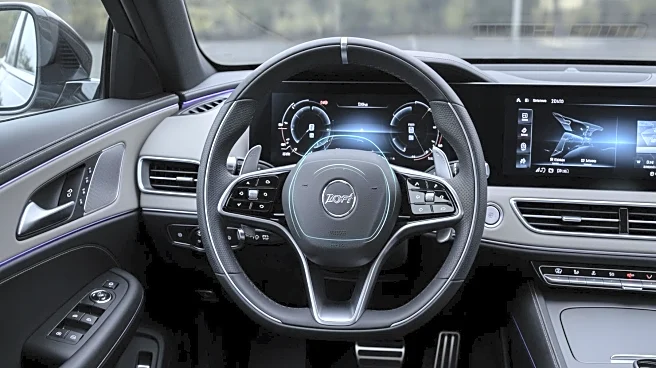What's Happening?
General Motors (GM) has announced the introduction of eyes-off driving capability for the Cadillac Escalade IQ, set to debut in 2028. This feature will initially be available on highways and will be accompanied
by conversational artificial intelligence (AI) features launching next year. The eyes-off driving system integrates lidar, radar, and cameras, utilizing sensor fusion technology to create a perception layer. This system is part of GM's next-generation intelligent vehicle development program, which also includes the integration of conversational AI with Google Gemini. The AI will enable natural language interactions, allowing drivers to draft messages, plan routes, and access contextual information. GM plans to further develop its own custom-built AI to enhance vehicle intelligence and personalization.
Why It's Important?
The introduction of eyes-off driving and conversational AI in GM vehicles marks a significant advancement in automotive technology, potentially transforming the driving experience. This development could lead to increased safety and convenience for drivers, as the system is designed to handle driving tasks autonomously under certain conditions. The integration of AI also suggests a shift towards more personalized and intelligent vehicle interactions, which could enhance user satisfaction and vehicle efficiency. For the automotive industry, this represents a step towards greater autonomy and connectivity, potentially influencing market trends and consumer expectations.
What's Next?
GM's eyes-off driving system and conversational AI are set to run on a new centralized computing platform debuting in 2028. This platform will enhance the vehicle's AI performance and bandwidth, supporting the integration of propulsion, steering, braking, infotainment, and safety systems. As these technologies are rolled out, GM will likely face regulatory scrutiny and will need to ensure compliance with varying state laws regarding autonomous driving. The company may also need to address consumer concerns about data privacy and security as vehicles become more connected and reliant on AI.
Beyond the Headlines
The development of eyes-off driving technology raises ethical and legal questions about liability in the event of accidents involving autonomous vehicles. As GM and other automakers advance these technologies, there will be ongoing debates about the balance between human control and machine autonomy. Additionally, the integration of AI in vehicles could lead to broader societal changes, such as shifts in employment for professional drivers and changes in urban planning as transportation becomes more automated.










